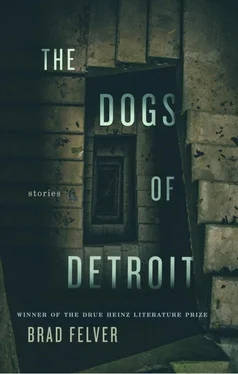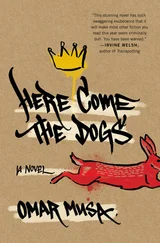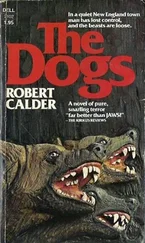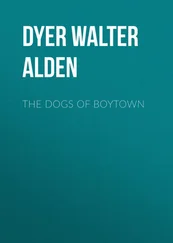“We don’t have money for that.”
“I’ll figure something out.” I’d learned from my father that if you just order something first and worry about how to pay for it later, the whole situation really becomes somebody else’s problem. Who would come repossess a casket?
“I still need to call your brother and tell him.”
I hadn’t even thought of my brother. He worked at a bank over in Fort Wayne, which meant we didn’t know how to talk to each other anymore.
I took the long route to school, which wound me all the way around the Garcher place. I guess I wanted to torture myself. Charlie himself was out getting the mail at the end of their lane, and he waved at me, so I pulled off for a minute.
“Sorry to hear about the old man,” he said. “He was a tough old bird.”
“Yeah.”
“How’s your mother doing?”
“You know how she is. Mostly mad about how expensive it is to die.”
“I hear that,” Charlie said, which was a stupid thing to say because the only people who’d ever died on him were his in-laws, and they left him four hundred acres and God knows how much cash under the mattress. “You know what you’re going to do yet?” he asked, meaning, could I buy your land out from under you?
“We’ll figure it out after the funeral.”
“I’ll run the backhoe over tonight,” Charlie said. “Then you can use it whenever works for you.”
“Thanks again,” I said, though what I really meant was fuck you and your stupid face . “It really means a lot to us.” Maybe flattery would make Charlie think he was letting us use his backhoe for free. I was going make him send me a goddamned bill if he wanted our money so goddamned bad. When I drove off, I made sure to gas it a little extra and kick up the gravel in his lane, which was a stupid little gesture that made me feel awfully good.
I made it to sixth bell a few minutes late and realized I didn’t have a lesson planned, so I just told them to use the time as study hall, and I sat there and planned something for American Government. Most of the kids sat there texting, which was against the rules, but I never enforced that one. Running a small farm teaches you never to punch back against technology because technology always wins.
Cassidey was the first one in for seventh bell. She seemed startled when she saw me. “I heard you were absent today.”
“I’m here now.”
“You look like hell, Ralph.”
She was wearing those low-cut Levis that showed her hip bones, also against schools rules, also not enforced by me. It used to be you never had to think about these sorts of things, but now I wouldn’t meet with a student, male or female, unless my door was wide open.
I started my lesson, which was supposed to be about the Wilmot Proviso and the Compromise of 1850, how they bled into the Civil War, but this led me backward to the Missouri Compromise and then all the way to the Treaty of Ghent and how those frameworks really encouraged the settlement of the Ohio River valley. It was enough material for ten lessons, and I was lecturing in a disorganized mess.
“During the Era of Good Feelings,” I found myself saying, “People were settling this region and carving out nice little farms. Some of you still live on those farms. When James Monroe became president, he wanted to raise the price of land in this area, but Congress thought settlement was more important than revenue, so they actually made it so you could buy as little as eighty acres at a time. Pretty soon, Ohio was the fourth biggest state.”
“Why are we talking about James Monroe?” Cassidey asked.
“This is important,” I said, immediately realizing how inadequate that was.
“Is this going to be on the AP test?” another student asked.
“I don’t know,” I said. “No.”
So I stopped lecturing, and we took another practice AP test for the rest of the time, and I sat there wondering why I came in at all.
Cassidey lingered for a few minutes after the bell, and I tried to ignore her by packing up my bag like I was in a rush. “Are you sure you’re okay?” she asked. She stretched up to wind her hair into a bun, which showed her hip bones again and a little chain dangling from her belly button.
“I’m fine,” I said. “One of those days, I guess.”
“I understand,” she said. “I have to work until close tonight. We get pretty busy at the bar on Fridays.” Cassidey worked over at the Applebee’s.
“They let you serve alcohol?”
“They aren’t supposed to,” she said, grinning mischievously. She sat next to me on the edge of my desk. “But who’s going to tell? Like, who really cares anyway? Everybody around here drinks.”
Right then Hal Owens came to the door, probably to check on the substitute teacher I’d sent home. “What are you doing here?”
“That’s what I said, Mr. Owens,” Cassidey said.
Hal looked at her, clearly making unflattering assumptions that he wouldn’t have made if she were ugly.
“Just wanted to get out of the house,” I said.
Hal stood there for a beat longer. “Okay. See you later.”
“Anyway,” Cassidey said immediately after he’d moved on, “like I said, we get kind of busy, but there’s usually room at the bar.”
“Well,” I said, “hang in there tonight.”
She walked toward the door and pulled her bag up over her shoulder. “Oh, yeah,” she said. “Could you write me a letter for Ohio State?”
“Sure,” I said, thinking that she probably wouldn’t get in to Ohio State and that she was almost certainly applying for the wrong reasons. Columbus ate these small town kids alive. Ohio State? Yale? For a girl like Cassidey, the difference was negligible.
I went over to Khulman’s Funeral Parlor after that and tried to get a casket. Maxine Khulman, who ran the day-to-day, was someone I knew in the sense that we waved when we saw each other after Mass, but we never stopped to chat. The Khulmans were a family of long-lived people, most of them going past a hundred, which I’d always found funny in a way you couldn’t say out loud. The Khulmans had always lived in town, and we had always lived outside of town, and even now that meant a gulf hung between us.
“Look,” she said and pulled her reading glasses off. “I’m so sorry to hear about your father. A real tough old bird. But legally it can get messy if I sell you a casket and I know you’re going to use it on land that hasn’t gone through proper zoning.”
“Jesus, Maxine,” I said, “We’ve been using our plot for two-hundred years. The whole damn family is buried out there. We can’t be the only people around here who still use a family plot.”
“You put me in a tough position here, Ralph.”
“I know,” I said, trying to sound empathetic even though I was just annoyed. All the permission you need to die now. “What if I just left a check here on your desk and you happened to leave open your back door with some basic model. Plausible deniability. That’s what Allen Dulles called it during the Cold War.” Fifty years old, and even now when I talked to people in town, people who didn’t run plow, I still felt the need to remind them I was educated. I always felt crummy after I did it, but I also couldn’t stop myself.
So I wrote her a check for $1,200, knowing that the account didn’t have much more than $300 in it, but that was Maxine’s problem now. Her son helped me load the casket into the back of the truck, and I drove home. My brother Mark’s car was parked in my usual spot. It was a low-riding Mercedes or Audi something that looked more like a spaceship than a car. I pictured him easing it down our long lane, trying to keep the gravel from kicking up into the undercarriage.
Читать дальше












